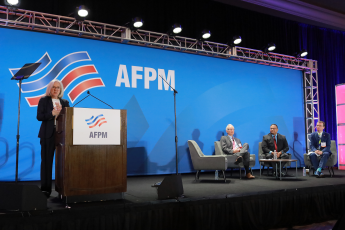The petrochemical and petroleum refining industries are always in flux. Whether it is new supplies like oil sands-derived synthetic crudes or tight oil crudes and condensates; new technologies like modelling enabled by advanced-computing power; improved sensor technologies; or new market conditions such as inexpensive hydrogen from natural gas, the world doesn’t stand still and we are constantly adapting to it.
The Annual Meeting technical program keeps up with changes in the industry by tweaking the program content each year to incorporate topics that are the “latest”. For 2016 there are four sessions that demanded to be included in the lineup:
• Water issues
As much as we all love crude oil and the fuels and petrochemicals that we produce from it, petrochemical plants and petroleum refineries can’t operate without water to produce steam, absorb heat from process streams, or desalt crude oil, among others. This year a whole session will be devoted to water supply issues and reducing water usage; optimizing the cooling water systems; and technology improvements for treating wastewater.
• Environmental
Environmental issues are almost always near the top of AFPM members’ critical issues lists. The topics in the Environmental session include: fenceline monitoring; RCRA compliance; handling sour gases; performance of sulfur recovery units; and the implications of the refinery residual risk rule.
• Plant Automation
The silicon chip revolution has resulted in an expansion of computing power and its incorporation into process plant operations so that planning tasks that used to be done weekly can now be done hourly and complex process control tasks can be performed continuously. This has resulted in advances in process modelling, linear programming, and process control that have driven significant process optimization improvements throughout the enterprise. Automation has now moved on to making the equipment “smarter” (the internet of things) and smart equipment applications in refinery operations will be addressed in this session. There will also be presentation on improving the performance of plant group responsible for advanced process control implementation and a presentation on the Dark Side of all this interconnectivity – cybersecurity hazards.
• Turnarounds
Turnarounds are important activities in process plants not just because they offer an opportunity to address operating problems, but because they also offer opportunities to upgrade equipment and systems which enable step changes in plant performance. This year several turnaround topics will show up in the Operations and Plant Automation sessions which will address optimization of turnaround scope, equipment additions that can enable plant automation opportunities, and executing the turnaround within a shorter time window.
The industry continues to adapt and change, and the Annual Meeting technical program aims to keep you up to speed with the latest technology developments.
Topics


